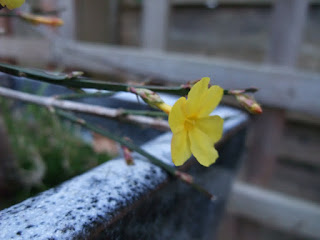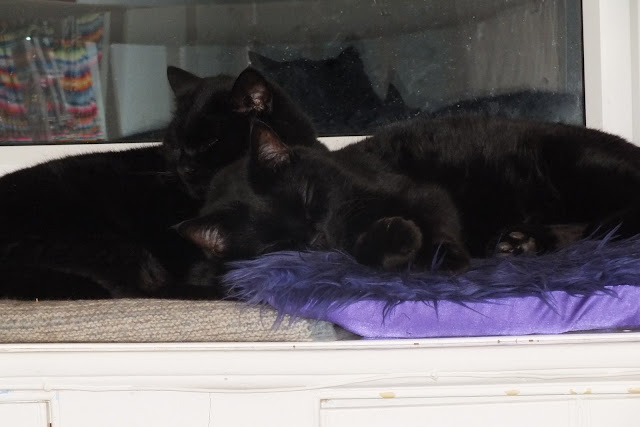What else have I been doing? Dyeing cloth, planning City and Guilds , doing practical design exercises, stitching shadow work in between times and reading. Oh, and going to work! Some of my reading has been of Ganna's novels. These are the three I have read since my last post.
 Look on the Fields was published in 1935, a year after Barney's Bend. Here is the cover, once more a lovely Rowland Hilder image.
Look on the Fields was published in 1935, a year after Barney's Bend. Here is the cover, once more a lovely Rowland Hilder image.It was, as I recall, the novel she felt had worked the least well, though for me it is a delight because it paints such a clear portrait of her family. At it's heart are three children living in Ireland, who welcome their cousin into the family. She is a fragile soul, who reminds me of Aunt Connie - Ganna's eldest sister, who was the most brittle boned of the three girls. In this story, her ankle is crushed in an accident - in reality, Connie's ankle was trodden on by a horse and was thereafter, twisted and weak. At the heart of the family are their mother, who watches the comings and goings of her household with patient amusement, and their their father, a gentle dreamy man who is the small town's dispensing chemist, as was my great grandfather in Arklow, where they grew up. She paints such a clear picture of this little seaside town, with it's groups of donkeys trotting down the high street at market time, and the ever present sea shushing at the shore... she touches on religion and on Ireland's struggle for independence; it was something she experienced fist hand as a young woman, and was part of the reason they left Ireland, the other being the death of her own gentle, dreamy father in 1914.
 Grey Geese is also set in Ireland, near Arklow, but out on the plain beneath the blue brooding hills, that change with the weather. It concerns the way in which family hatred can twist a family for generations. It also has overtones of the political background, but is more concerned with the relationship between a young woman, widowed by the political struggle, her three children, and her father. He chimes with a previous character in Barney's Bend; both have a spiteful nature, that mocks all around it and manipulates others. She writes of the difficulties of poverty in a small 1930's Irish town, the standing forever to the back of the queue in the main shop, where each knows the others' business; waiting until all have been served, and the Widow has privacy to beg.
Grey Geese is also set in Ireland, near Arklow, but out on the plain beneath the blue brooding hills, that change with the weather. It concerns the way in which family hatred can twist a family for generations. It also has overtones of the political background, but is more concerned with the relationship between a young woman, widowed by the political struggle, her three children, and her father. He chimes with a previous character in Barney's Bend; both have a spiteful nature, that mocks all around it and manipulates others. She writes of the difficulties of poverty in a small 1930's Irish town, the standing forever to the back of the queue in the main shop, where each knows the others' business; waiting until all have been served, and the Widow has privacy to beg.These were all written before the Second World War, in 1934/5/6 when my mother was a child. Then came the war, and a gap in both time and the progress of life.
By 1952, when the next novel appears, Ganna had looked after, then lost her own mother, my mother was grown, England had been through hell and people had struggled on. Her later novels were written, and set, in England, where she had moved in 1921 as a newly engaged young woman. They center around similar people, but in a different world. For Flute and Piccolo was her last novel, published in 1955. I am saving the intervening two because one is my favourite, and because I realised that I'd not read this one.
 This novel is set in a town that feels a little like Hastings, but Hastings of the 1950's where church bells still toll through the quiet of Sunday afternoons. We are moving in small town polite society, where all business is known and nothing interrupts weekend tennis at the club. Again, the story is of families, and how the various characters interact with each other. One, a rather dowdy woman is the long time wife of the eldest son of the family. Near the middle of the novel she experiences the latest of what are obviously a string of failed pregnancies; we see her hope and delight when she knows she is pregnant, and feel her numb despair as the pregnancy fails once more. I know that Mum, Ganna's only child, was herself conceived after multiple miscarriages, a phantom pregnancy and the stubborn resistance of my grandfather, who wanted no children. As I read this novel, I asked myself how much of her own experience flows in her description of this woman's, always seemly, suffering. The novel, which is in part about the coming of age of the two youngest family members, also portrays the very delicate and gentle relationship between the (once more widowed) mother of the family, and a man who was a childhood sweetheart, and is once more in her life. As with her other novels, the thing that is valued above all else, is kindness, the same kindness that was at the heart of my childhood.
This novel is set in a town that feels a little like Hastings, but Hastings of the 1950's where church bells still toll through the quiet of Sunday afternoons. We are moving in small town polite society, where all business is known and nothing interrupts weekend tennis at the club. Again, the story is of families, and how the various characters interact with each other. One, a rather dowdy woman is the long time wife of the eldest son of the family. Near the middle of the novel she experiences the latest of what are obviously a string of failed pregnancies; we see her hope and delight when she knows she is pregnant, and feel her numb despair as the pregnancy fails once more. I know that Mum, Ganna's only child, was herself conceived after multiple miscarriages, a phantom pregnancy and the stubborn resistance of my grandfather, who wanted no children. As I read this novel, I asked myself how much of her own experience flows in her description of this woman's, always seemly, suffering. The novel, which is in part about the coming of age of the two youngest family members, also portrays the very delicate and gentle relationship between the (once more widowed) mother of the family, and a man who was a childhood sweetheart, and is once more in her life. As with her other novels, the thing that is valued above all else, is kindness, the same kindness that was at the heart of my childhood.













